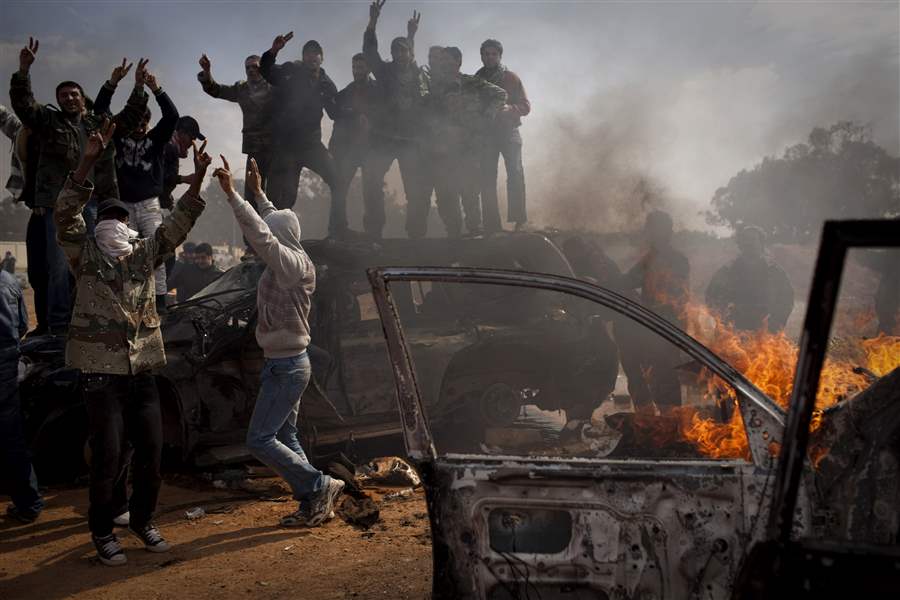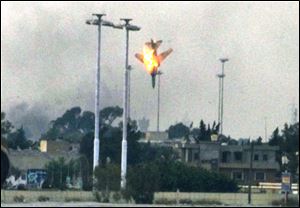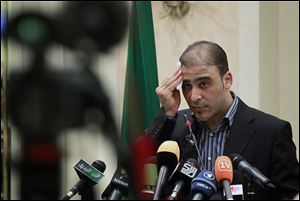
U.N. allies hit Libya
3/20/2011
Libyan rebels celebrate as cars burn after Muammar Kaddafi's forces were pulled back from Benghazi, the last stronghold of the rebellion. Earlier, the city rocked with explosions as Kaddafi's troops entered the city.
ASSOCIATED PRESS

After possibly being shot down, an unidentified plane plummets to the ground over the outskirts of the rebel-held city of Benghazi, resulting in a fireball, right.
The allied missiles targeted Kaddafi's radars, transmitters, and anti-aircraft batteries to signal the start of a multination military campaign intended to protect Libyan civilians and rebel forces.
The U.S. and British missile barrage opened up the skies over Libya for flights by warplanes from other countries as the Obama Administration ceded to allies the primary responsibility for policing Libyan airspace.
President Obama, in remarks shortly before the missiles flew, said Kaddafi had brought the attacks upon himself by failing to heed international demands for a cease-fire.
"This is not an outcome the United States or any of our partners sought," Mr. Obama said from Brazil, where he was starting a five-day visit in Latin America. "We cannot stand idly by when a tyrant tells his people there will be no mercy."
Thousands of Kaddafi supporters, meanwhile, gathered at airports and outside Kaddafi's home in the capital, effectively becoming human shields.
"I'm not scared, because I am here with my leader," said teacher Azoum al-Mishaei, 30.
Libyan state TV claimed 48 people had been killed in the attacks, but the report could not be independently verified.
The Libyan leader vowed to defend his country from what he called "crusader aggression" and warned the involvement of international forces will endanger the Mediterranean and North African region and put civilians at risk.
"It is now necessary to open the stores and arm all the masses with all types of weapons to defend the independence, unity, and honor of Libya," he said in an audio message aired on state TV hours after the strikes began.

Libyan rebels celebrate as cars burn after Muammar Kaddafi's forces were pulled back from Benghazi, the last stronghold of the rebellion. Earlier, the city rocked with explosions as Kaddafi's troops entered the city.
Libyan state television reported that targets in the capital and four other cities had been attacked. No explosions were heard in central Tripoli.
Occasional bursts of anti-aircraft fire punctuated the night, but it did not appear they were targeting aircraft.
The assault began less than 48 hours after members of the U.N. Security Council approved a resolution authorizing military force to prevent the annihilation of civilians and rebels who have been under siege by Kaddafi's military for more than two weeks.
As Libya's assaults on the last opposition strongholds escalated, U.S. and European allies moved quickly to begin implementing a no-fly zone.
Early yesterday, Secretary of State Hillary Clinton joined foreign ministers from 22 countries in Paris to work out details of the plan.
"We have every reason to fear that, left unchecked, Kaddafi will commit unspeakable atrocities," she said in a Paris. The U.S. role, she said, was to "support an international coalition as it takes all necessary measures" to enforce the U.N. resolution.
The military campaign against Kaddafi began as about 20 French fighter jets roared into Libya to start carving out a no-fly zone over Benghazi. The French jets began patrolling a 600-mile area over Benghazi, Libya's second-largest city, and fired rockets on at least one Libyan vehicle near the rebel stronghold in eastern Libya.
"A first target was engaged and destroyed," a French military spokesman said.
French President Nicolas Sarkozy confirmed in a televised address that French warplanes had entered Libyan airspace to prevent Kaddafi's "murderous madness" against Libyan civilians.
The wave of missile strikes against Libyan air defenses began after the French sorties. More than two dozen warships and a large number of warplanes made up the initial strike force, which was led by the U.S. military's Africa command, a senior U.S. military official said.

Libyan spokesman Ibrahim Musa stops after reading a letter to President Obama by Muammar Kaddafi.
The air-defense sites targeted in the initial salvo are primarily around Tripoli, Misrata, and an area between Misrata and Benghazi, Pentagon officials said.
The strikes began as Kaddafi's forces pushed into Benghazi, where the opposition forces were making a final stand.
Backed by tanks and snipers, Kaddafi's forces swept into residential areas and engaged in fierce firefights with rebel fighters who fought with Kalashnikov rifles and machine-gun-mounted pickup trucks.
For most of the day Benghazi was a ghost town, with streets barricaded and stores shuttered.
Most residents stayed inside; men formed neighborhood protection committees to secure their enclaves.
Dozens were killed or injured in the street clashes that unfolded in several neighborhoods.
By afternoon, Kaddafi's forces had withdrawn from Benghazi.